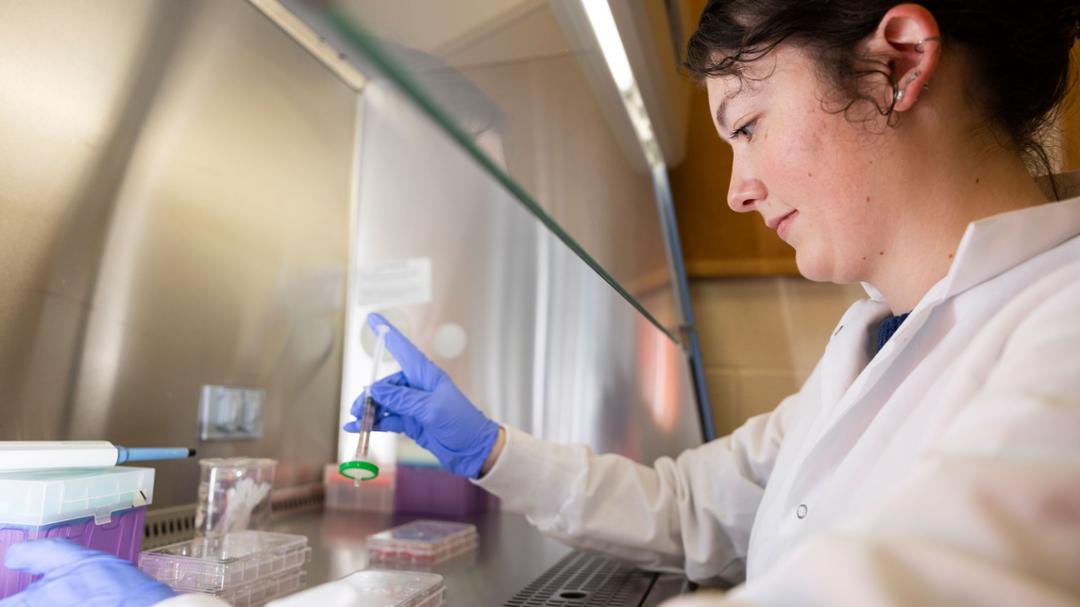With the guidance of her faculty advisor Ethan Chen, Reagan Farrell is on a quest to prevent breast cancer cells from spreading.
The best journeys are the ones we never ask for. They can terrify us and push us to our limits. At the end of a journey, we are transformed – for better or worse – hardly recognizable from the person we were at the beginning.
Fictional stories about journeys have centered on main characters like Odysseus in “The Odyssey,” Frodo in “The Lord of the Rings” and Neo in “The Matrix.”
Reagan Farrell, a first-year doctoral student within the Department of Biological Sciences at Texas Tech University, has been on a bit of a journey herself.
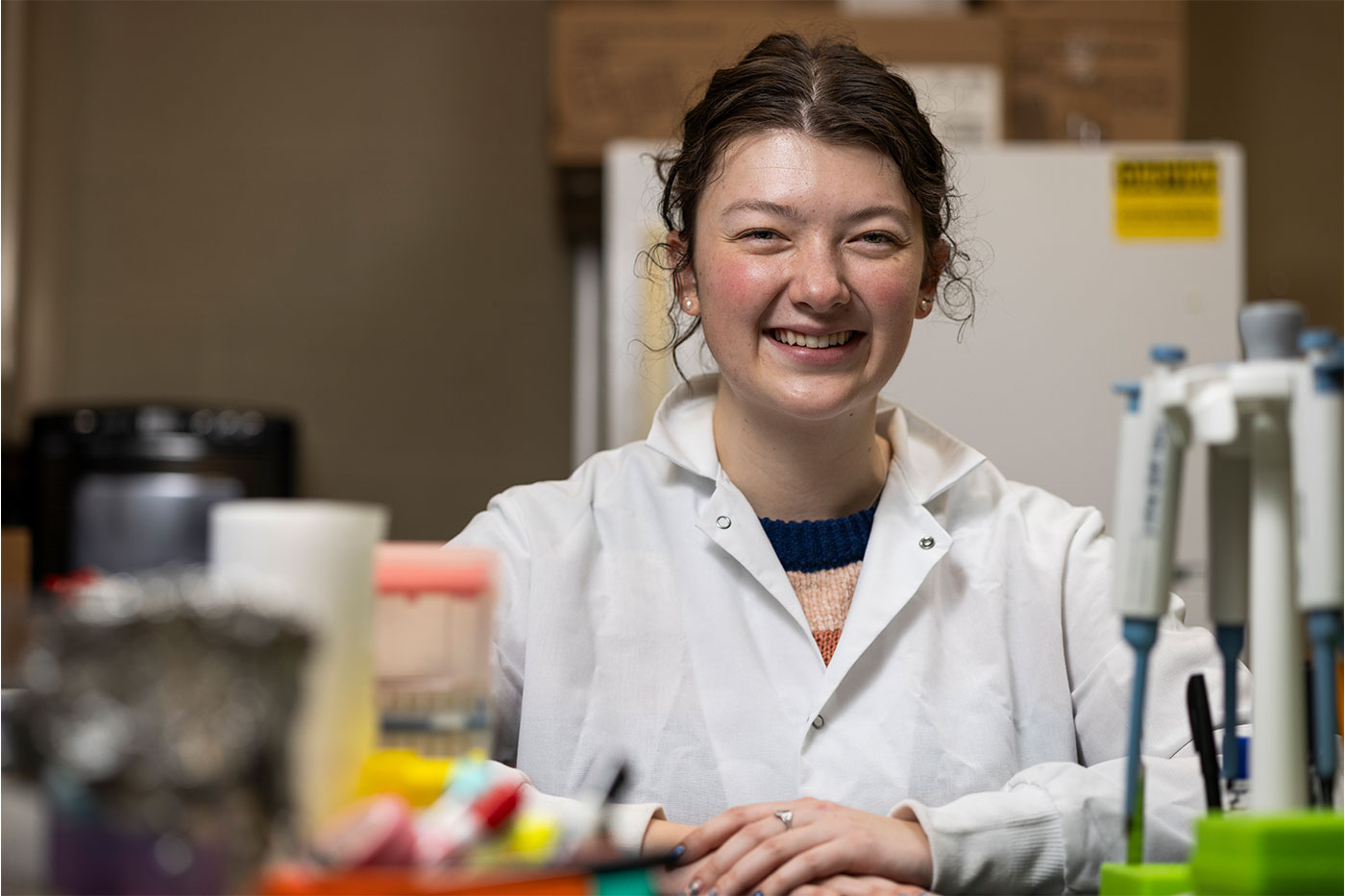
In terms of physical travel, Farrell was born in Canada, lived in Doha, Qatar for some time, and traveled extensively. At 10 years old, she and her family moved to The Woodlands, Texas, 30 minutes outside of Houston.
“I really loved the Texas atmosphere and growing up and going to high school here,” Farrell said. “I knew I wanted to stay in the state, and I looked at Texas Tech. It had the same atmosphere I loved.”
Farrell was also drawn in by Texas Tech’s medicine and sciences programs, and she enrolled at the university as a pre-med student. She felt Texas Tech had resources to allow her the flexibility to explore several potential paths, though she was not sure which was right for her.
During her senior year, months before graduating, Farrell started to have second thoughts. The medical school application process was daunting, and she was starting to doubt if she even wanted to be in that strenuous environment. She planned on taking a gap year after graduating to regroup and reconsider her future. But that all changed one day in her immunology class.
Her professor announced that Ethan Chen, assistant professor of biological sciences, recently joined the faculty and needed researchers in his lab.
Farrell took a stab in the dark and emailed Chen about the opportunity.
“I really focused on my clinical experience and coursework, so I didn’t do much research,” Farrell said of her time as an undergraduate student. “I emailed Dr. Chen and said I was in this weird spot of wanting a one-to-two-year gig, but that I would work as hard as he needed me to. I really wanted to get the experience I didn’t get as an undergrad.”
Chen soon replied, and the two had their first meeting.
The Journey’s Guide
Many journeys feature an experienced guide. Someone who can advise the main character and set them on the right, though sometimes difficult, path. These guides offer the necessary push to facilitate the main character’s growth.
Odysseus had Athena. Frodo had Gandalf. Neo had Morpheus.
Reagan Farrell has Ethan Chen.
The first meeting between Farrell and Chen set the tone for the years and mentorship to come.
It was Halloween. The air was crisp, and the day felt noticeably short. Lubbock was settling into its hibernation as brown had become the dominant color throughout the Texas Tech landscape. In contrast of fall’s earthy tones, Farrell opted to celebrate the holiday by painting her fingernails black with green slime trails running from the base of her nails to the tip.
“As soon as I walked into his office, he’s like, ‘Oh, I like your nails.’ I was like, ‘OK, yeah, I can work with you,” Farrell joked.
What actually stood out to Farrell in that first meeting was the trust and agency Chen offered her. She was given the chance to pick from three different projects his lab was working on.
Farrell selected her project and joined the lab as a non-thesis master’s student. She would be investigating different iron distributions in the tumor microenvironment and how the trace element helps breast cancer cells proliferate and spread.
Under Chen’s guidance, Farrell conducted experiments using various techniques. She used polymerase chain reaction to make millions of copies of a specific DNA sample and to characterize gene expression of iron transporters. She saw and confirmed that iron is stolen from macrophages (a type of white blood cell that stimulates the immune system) by using iron staining to visualize iron deposits in macrophages and flow cytometry to analyze and characterize cells in a fluid sample.
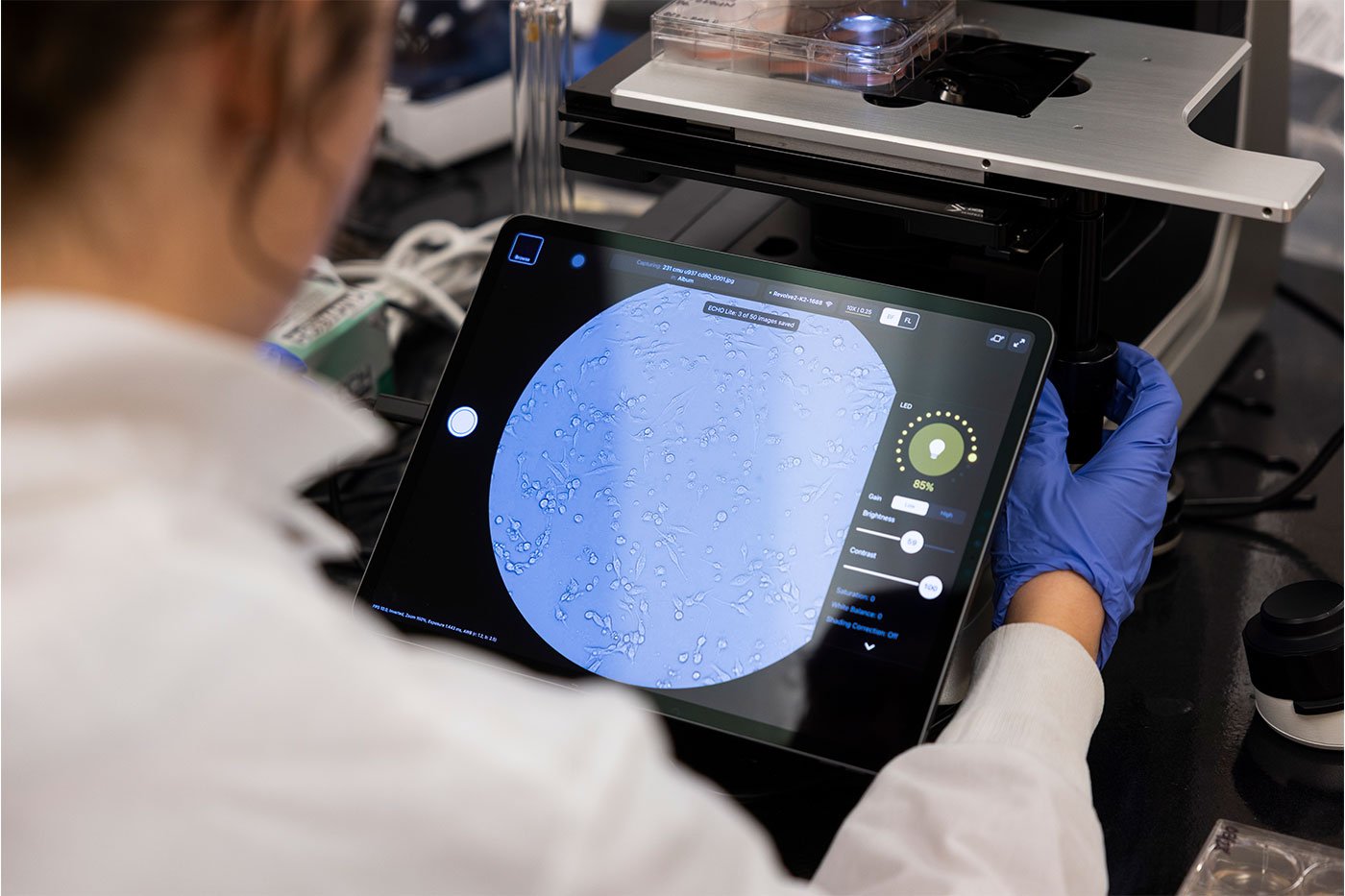
“She only had experiences from lectures; she didn’t have real laboratory experience,” Chen said. “But she actually learned a lot very fast.”
Chen empowered Farrell to come into her own as a researcher. His open-door policy meant he was available to Farrell but not hovering over her. She had room to figure things out, make mistakes and ask questions. In fact, Farrell credits Chen for helping her overcome her imposter syndrome.
“Before, I was like, ‘I don’t know anything. I have no experience. What am I even doing here?’” Farrell remembered. “Dr. Chen is really good at encouraging me and making sure I’m still focused on the main goal of doing research.
“I’m doing my own thing, but if I ever need him at any step of the protocol, he’s always there. That’s really inspired me to work hard.”
It was not until Farrell attended The San Antonio Breast Cancer Symposium with Chen that she fully realized her passion for research and her mentor’s importance.
Chen had received an email about a potential doctoral student joining his lab. Before saying yes to the student, he wanted to give Farrell a chance to stay onboard and earn her doctorate. But he did not want to push Farrell since he knew how Farrell initially saw her work in the lab and her initial goal of medical school.
“He said, ‘Until I hear that you are stable in you next adventure, whatever it is, I’m not going to confirm that student,’” Farrell recalled. “He’s really caring and really invested in my success.”
The reality of ending her research and her relationship with Chen made it clear to Farrell: she wanted – no, she needed to stay in the lab and earn her doctorate.
The Journey’s Transformation
At the end of a journey, the main character is transformed.
Odysseus transforms from an arrogant soldier to a humble hero. Frodo transforms from an innocent hobbit to a haggard adventurer. Neo transforms from a person trapped in the Matrix to The One who can destroy it.
Though her journey has not come to an end, Farrell is certainly transformed.
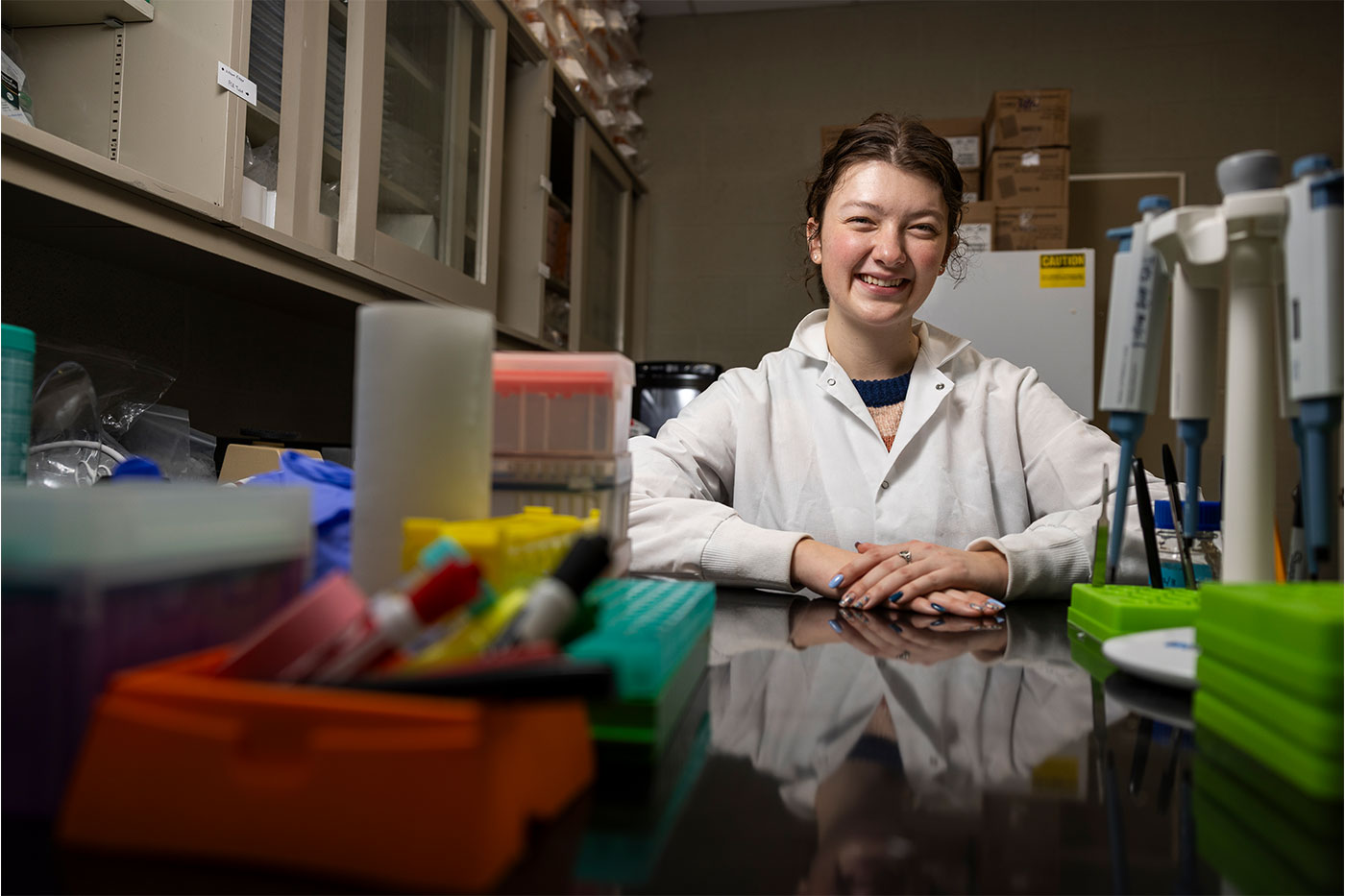
As a master’s student, Farrell believed her responsibilities lay with not slowing down Chen’s work. It was less that she did not care about the underlying reasons or methods behind the research and more that she felt there wasn’t time for her to know the finer details. As a master’s student, she felt there was a condensed time frame to get any work done.
That has all changed now that she is working on her doctorate.
“As a master’s student, I didn’t know why Dr. Chen picked iron distribution, breast cancer behavior or immunology,” Farrell said. “I’m now able to go back and get that foundation Dr. Chen has and retrace his steps to figure out why he chose this project. That has been super helpful because I’ll see keywords that I’ve recognized in the past or worked with in some way, but now I understand things better.”
Farrell’s work has also grown along with her academic ambitions. Her project is now looking at current metastasis drugs to see if there is potential for new breast cancer treatments to prevent cancer cells from spreading.
“Currently there are no tumor metastasis drugs on the market,” Farrell said. “So, we’re pairing what I found from iron ‘hoarding’ in breast cancer with current market chemo drugs to see if we can make a more sophisticated and more accurate drug to combat breast cancer metastasis.”
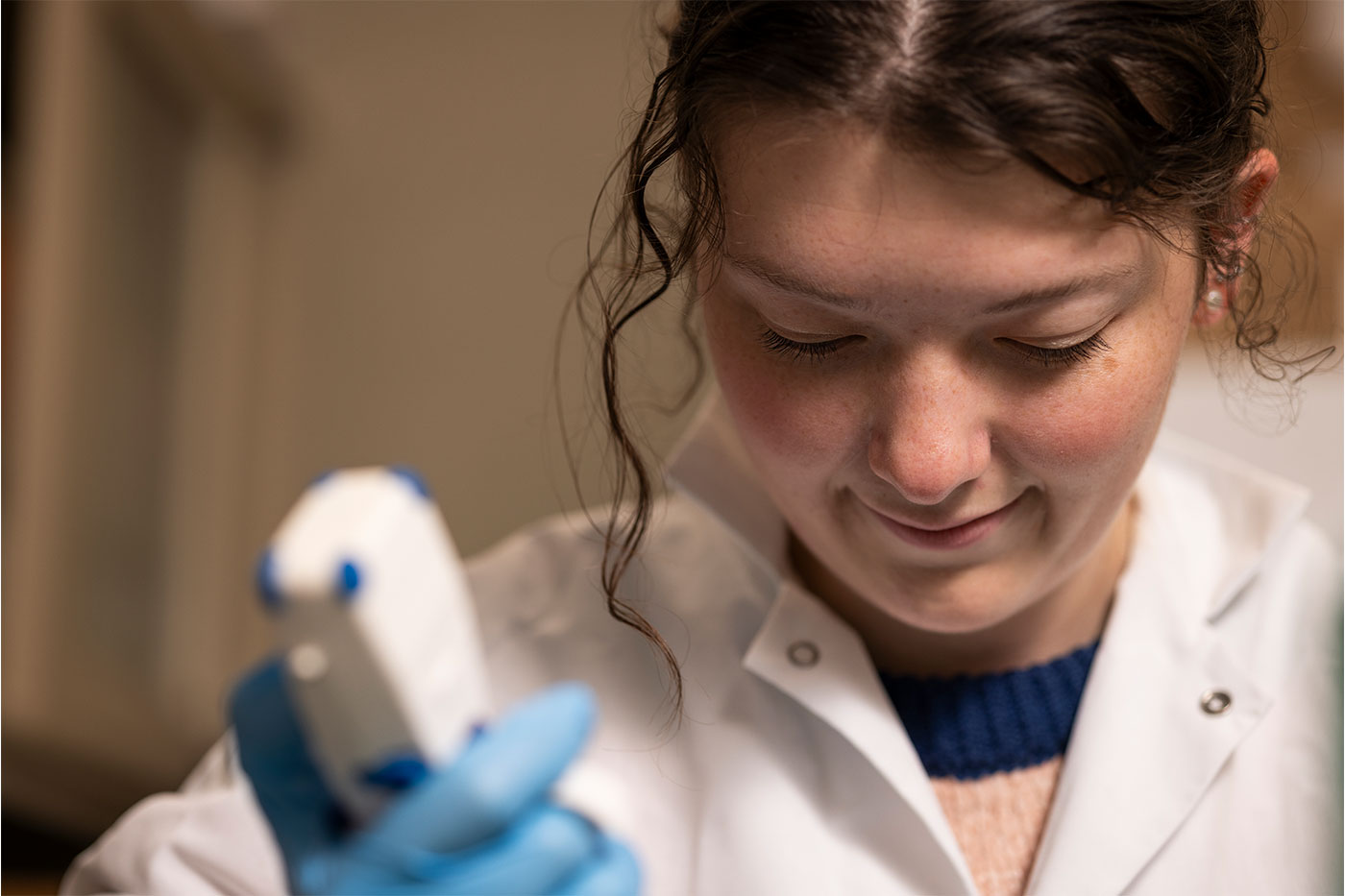
Though her first year in the doctoral program hasn’t even finished yet, Farrell already has published one research paper in which she appears as the first author, or primary contributor, and another paper is in the works.
“The first paper went through revisions for about eight months,” Farrell recalled with a hint of exasperation. “It took a long time, but after it was accepted, I felt fantastic. To feel like this and have a sense of success from working and doing this research every day was great.”
Chen hopes the doctoral students in his lab graduate with at least two first-author publications, and he is proud of the progress Farrell has made in just her first year as a doctoral student.
Of course, Farrell hasn’t done the work alone, gaining more than just Chen’s ever-present guidance.
“I attribute most of the success I’ve had and the things I’ve learned to Dr. Chen and the other graduate students in my lab,” Farrell said. “I think that level of support would be difficult to find anywhere else. I’m so grateful for them and for Texas Tech.”
Over the course of her journey, Farrell has become comfortable with her place in the science world and with herself as a researcher. But most importantly, Farrell has found purpose in her work.
“I think that hands-on part of the research process is what most appeals to me,” she said. “I feel like whatever I’m doing day-to-day will end up being worth something later.”

